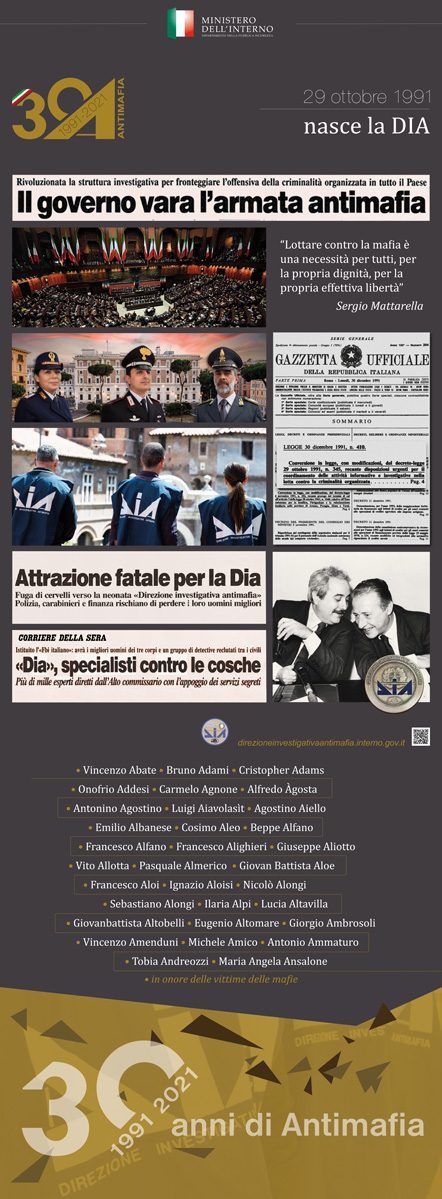

THE DIA WAS BORN
On 29 October, 1991, in the aftermath of cosa nostra massacre season, Decree Law no.345 established the Direzione Investigativa Antimafia.
The aim was to curb the escalation of organized crime.
Judge Falcone gave a fundamental contribution to DIA creation. He had always been committed to give shape to one of his key principles (the so-called Falcone method), that is to constantly follow the money trail in order to intercept mafia economic expansion strategies both in Italy and abroad, through judicial and preventive investigations .
This method became the raison d’être of the DIA. Its functions were outlined by Falcone himself who advocated the creation of: “an agency in charge of judicial investigations and therefore a technical body”, adding that the activities carried out by what he called “the anti-crime police of the future” would “depend, to a greater extend, on the effectiveness of preventive investigations”, which “will allow greater flexibility in the intervention by law enforcement agencies, as urged on many sides”.
In order to create the DIA it was necessary to reorganize the entire sector of public security, within which the High Commissioner had been the first authority responsible for the fight against mafia crime. Indeed, the DIA took the place of “The High Commissioner for the Coordination of the Fight against Mafia crime”, taking over many of its central duties, assuming however very different structural and functional features.
The DIA opened a new chapter in the fight against crime, considering that up to that moment, each agency had multiple functions while, from this point onwards, there was a dedicated agency with a specific task.
The Direzione Investigativa Antimafia is, in fact, a single-function investigative multiagency. Its staff comes from the three Italian law enforcement agencies and has the exclusive task to coordinate and carry out preventive investigations into organized crime as well as to carry out judicial investigations relating to the participation into mafia-type associations or into mafia-type crimes.
The DIA is part of the Department of Public Security and has the purpose to unify the action of law enforcement agencies in the specific anti-mafia sector, making use of personnel from the State Police, Carabinieri and Guardia di Finanza as well as, of civilian personnel of the Ministry of the Interior for administrative and technical-logistic management.
Following a wider analysis of the investigative models used to combat the more and more sophisticated and complex techniques used by mafia-type groups, a new “antimafia architecture” was created that, in addition to the “General Council for the fight against organized crime”, which is responsible for working out counterstrategies in the fight against crime, rationalising the resources used and periodically reviewing the results achieved, was entrusted with:
- judicial functions through the setting up, within the General Prosecutor’s Office at the Supreme Court of Cassation, of the “Antimafia National Prosecutor”;
- investigative functions through the creation of the Direzione Investigativa Antimafia.
Lastly, Article 12 of Decree Law no. 152 dated 13 May 1991 envisaged the creation of the “central and interprovincial services of the judicial police” at each law enforcement agency.
The law establishing the DIA thoroughly outlined the principle of competence specialization, focusing preventive and judicial police tasks on the crimes referring to participation in mafia-type association and mafia-type crimes only.
Finally, the international dimension of organized crime led the legislator to organize the Office in such a way as to give it full legitimacy to operate across borders, establishing a Branch exclusively in charge of encouraging and developing international relations for investigative purposes in the specific field. In this way, the DIA has adopted the perspective outlined by Falcone in the “World Ministerial Conference of Naples on Transnational Organized Crime” of 21-23 November 1994, according to which organized crime and economic crime must be addressed “as an absolute priority”, involving international structures, first and foremost the European Union.
The Minister of the Interior reports to Parliament every six months on the activities carried out and the results achieved by the Direzione Investigativa Antimafia.



